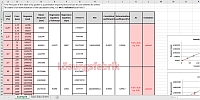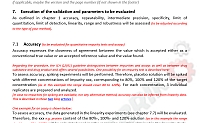Method validation
Template for linearity calculations of method validations

During method validations in pharmaceutical QC laboratories or commissioned contract laboratories, different validation parameters have to be checked. For quantitative impurity determinations and assays, such as content determinations of the active pharmaceutical ingredient or potency tests, studies of the linearity are required according to the method validation guideline ICH Q2(R1).
Intermediate precision
Template method validation plan all tests

Templates make life easier. This is true in every field of life. Since this blog is about topics in pharmaceutical laboratories, especially method validation, method verification and method transfer, we have started to provide templates for the validation of analytical methods according to ICH Q2(R1) considering their method type (identification method, impurity test or assay).


